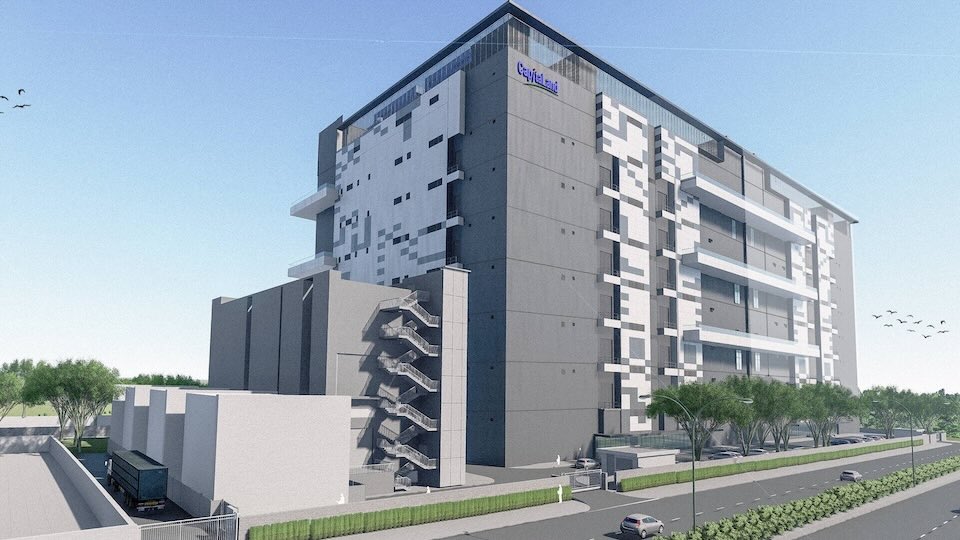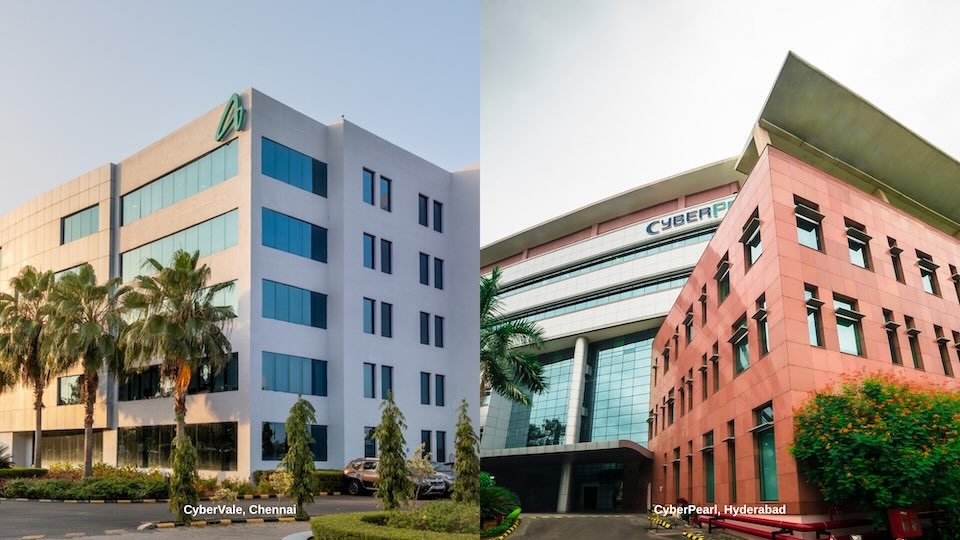kopi-C with CapitaLand India Trust CEO - Singapore’s Gateway To Investing in India
REITs
Powered by

By Julian Wong • 15 Oct 2025
Why trust Beansprout? We’ve been awarded Best Investment Website at the SIAS Investors’ Choice Awards 2025
Expanding beyond business parks into logistics and industrial assets, and data centres, CapitaLand India Trust brings together robust governance and dynamic growth from Singapore and India. CEO Gauri Shankar Nagabhushanam explains how this offers investors both steady distributions and long-term upside.

For many Singaporeans, the outsourcing boom of the early 2000s is still what comes to mind when hearing about India’s economy. Picture back-end operations staffed by young graduates handling customer service and IT support.
While the stereotype of India as a back-office nation has endured, it no longer matches reality.
Today, inside the campuses of CapitaLand India Trust’s business parks, engineers are designing tools for manufacturing semiconductor chips, scientists are working on drug discovery, and automotive firms are modelling autonomous driving systems.
“Gone are the days of merely having customer service centres,” says Gauri Shankar Nagabhushanam, CapitaLand India Trust’s CEO.
“Today, cutting-edge research and development (R&D) is happening out of India, and it’s happening in our parks.”
This shift is central to how CapitaLand India Trust is trying to reposition India in the minds of investors.
Listed on the Singapore Exchange (SGX) since 2007 and originally focused on business parks, the trust has steadily broadened into a platform that also spans logistics and industrial assets, and data centres.
With a portfolio valued at around S$3.7 billion as of June 2025, and spread across India’s major cities, it is currently the only India-focused business trust listed on the exchange.

A different kind of REIT
CapitaLand India Trust is structured as a business trust, rather than a real estate investment trust (REIT), which means it can go beyond merely acquiring stabilised, income-producing properties.
It has the flexibility to undertake development projects and forward-purchase agreements—partnering local developers and providing construction loans. This allows CapitaLand India Trust to earn interest from development loans and secure high-quality assets locked in at an attractive pricing, contributing to its growth pipeline.
In addition, the recent completion of Navi Mumbai Tower 1 Data Centre, along with its successful divestment of CyberPearl and CyberVale – a key step in its proactive portfolio reconstitution efforts to unlock asset value and strengthen financial agility, contribute to CapitaLand India Trust’s growth story.
As Nagabhushanam puts it, CapitaLand India Trust should be seen as a "Growth REIT within the REIT universe, and a stability play within the growth stock universe.”
CapitaLand India Trust should be seen as a "Growth REIT within the REIT universe, and a stability play within the growth stock universe.”
This balance is deliberate, Nagabhushanam explains. The forward-purchase pipeline offers visibility, development projects capture India’s structural demand for new space, and acquisitions from the sponsor help provide opportunities to scale.
For FY 2024, CapitaLand India Trust reported net property income of S$205.6 million, a 14% increase from the previous year. Income to be distributed to unitholders rose 7% to S$101.5 million.
This momentum continued into 2025. In the first half of 2025, CapitaLand India Trust’s net property income rose 11% to S$113.6 million, while its distribution per unit climbed 9% year-on-year to 3.97 cents.
Hence, as Nagabhushanam describes, for investors who are accustomed to the predictability of REITs, CapitaLand India Trust offers faster growth. For those who are drawn to the volatility and upside of growth stocks, it offers greater stability.
“Gone are the days of merely having customer service centres ... Today, cutting-edge research and development (R&D) is happening out of India, and it’s happening in our parks.”
Riding India’s growth trajectory
At the moment, India is the world’s fifth-largest economy, achieving ~6.5% annual growth in the 2024–2025 fiscal year. Its population is also young and overwhelmingly English-speaking.
More than 750 million Indians are of working age, and rising per-capita incomes are fuelling consumption, while the state and central governments are competing to attract investment by pouring money into infrastructure—from airports and highways to renewable energy grids and logistics corridors.
Yet, one result of this is, as Nagabhushanam points out, that India’s diversity is often misunderstood.
“India is not monolithic,” he notes.
“It is more like Europe or the United States, a union of states with very different economic strengths.”
Mumbai is the country’s financial capital, Bangalore is the IT hub, Chennai and Pune are centres of manufacturing and industry.
Holding a portfolio across these regions allows CapitaLand India Trust to capture multiple drivers of growth within a single vehicle. The trust’s business parks cater to the IT and R&D sectors, its warehousing and logistics facilities serve the consumption economy, and its new generation of data centres anchors India’s fast-expanding digital infrastructure.
He calls these the three necessities of modern life— work, consumption, and (digital) play—and sees CapitaLand India Trust positioned across all three.

Understanding and navigating India’s complexity
At the same time, Nagabhushanam acknowledges the hurdles that come with doing business in India.
In Hyderabad, for instance, data centre operators are required to use copper power cables, while in Chennai and Mumbai aluminium cables suffice, a small regulatory detail that creates a significant difference in costs.
Project approvals may also sometimes take longer than originally expected.
This is also precisely why CapitaLand’s 30-year presence in India gives it an edge.
Nagabhushanam says that the group has built relationships with state governments, contractors, and landowners, and it has a large local team (over four hundred staff across multiple cities) providing on-the-ground intelligence.
In the midst the pandemic, when only 4% of staff were physically working in offices, CapitaLand India Trust still collected 96% to 97% of rents. More recently, when the United States unexpectedly imposed a 50% tariff hike on Indian exports, many investors assumed the impact would be severe.
On the contrary, it was business as usual for most of CapitaLand India Trust’s tenants, with some shifting operations to India to offset higher costs elsewhere.
What excites Nagabhushanam now are the structural shifts that will sustain demand for the coming decades.
The government’s infrastructure drive is creating new corridors of growth, the digital revolution is transforming how Indians live and work, and mobile penetration and fintech adoption are among the fastest growing in the world. In turn, rising incomes are feeding directly into demand for housing, consumer goods, warehousing, and entertainment.
Against this backdrop, rents in Indian business parks remain comparatively low by global standards. As per-capita income rises, rents will inevitably inch upward, Nagabhushanam says, providing a powerful tailwind for long-term investors.
More than 750 million Indians are of working age, and rising per-capita incomes are fuelling consumption, while the state and central governments are competing to attract investment by pouring money into infrastructure.
The pitch to investors seeking reassurance

For Singaporean investors who are more familiar with local REITs anchored in shopping malls or office towers, CapitaLand India Trust presents a different proposition – it is a way to participate in India’s transformation.
CapitaLand India Trust upholds governance practices that are aligned with Singapore’s regulatory standards, and distributions are made in Singapore dollars, removing much of the friction of investing directly in Indian markets. This dual identity—an Indian growth story packaged in a Singaporean framework—is what the management team believes sets CapitaLand India Trust apart.
“A significant proportion of the investments we have made between 2021 and 2025 will start to bear fruit from 2026 to 2028,” Nagabhushanam says. “We are committed to deliver stable distributions alongside a stronger pace of growth.”
The trust has already delivered an average of 4% annual growth in distributions over the past decade, a testament to its resilience and ability to navigate India’s foreign exchange and business environment challenges. The goal now is to further improve returns and build greater predictability into its growth trajectory.
For investors, the message is simple: India’s rise is inevitable, and CapitaLand India Trust wants to be the vehicle through which investors ride that wave.
Related links:
- CapitaLand India Trust share price history and share price forecast
- CapitaLand India Trust dividend history and dividend forecast
About CapitaLand India Trust
CapitaLand India Trust (CLINT) was listed on the Singapore Exchange Securities Trading Limited (SGX-ST) in August 2007 as the first Indian property trust in Asia. Its principal objective is to own income-producing real estate used primarily as business space in India. CLINT may also develop and acquire land or uncompleted developments primarily to be used as business space, with the objective of holding the properties upon completion. As at 30 June 2025, CLINT’s assets under management stood at S$3.7 billion.
CLINT’s portfolio includes 10 world-class IT business parks, three industrial facilities, one logistics park, and four data centre developments in India, with total completed floor area of 22.7 million square feet spread across Bangalore, Chennai, Hyderabad, Pune, and Mumbai. CLINT is focused on capitalising on the fast-growing IT industry and logistics/industrial asset classes in India, as well as proactively diversifying into other asset classes such as data centres.
CLINT is structured as a business trust, offering stable income distributions similar to a real estate investment trust. CLINT focuses on enhancing shareholder value by actively managing existing properties, developing vacant land in its portfolio, and acquiring new properties. CLINT is managed by CapitaLand India Trust Management Pte. Ltd.. The Trustee-Manager is a wholly owned subsidiary of Singapore-listed CapitaLand Investment Limited, a leading global real asset manager with a strong Asia foothold.
About kopi-C: the Company brew
kopi-C is a regular column by SGX Research in collaboration with Beansprout (https://growbeansprout.com), a MAS-licensed investment advisory platform, that features C-level executives of leading companies listed on SGX. These interviews are profiles of senior management aimed at helping investors better understand the individuals who run these corporations.
Follow us on Telegram, Youtube, Facebook and Instagram to get the latest financial insights.
Read also
Most Popular
Gain financial insights in minutes
Subscribe to our free weekly newsletter for more insights to grow your wealth
Comments
0 comments
